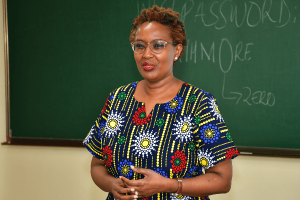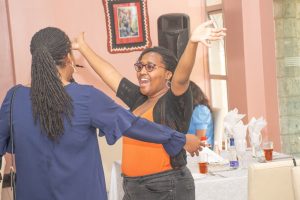SLS wins Inaugural Kenya National Disability Rights Moot Court Competition

Jude Oundo, Stacey Ombati and Ziwei Qi
“We did it Joe!” The Strathmore Law School (SLS) students aced the Inaugural Kenya National Disability Rights Moot Court Competition; a 10-day moot hosted by the University of Nairobi School of Law which involved all Kenyan universities with the aim of teaching students the rights of persons with disabilities.
SLS students, Jude Oundo (2nd Year), Stacey Ombati (2nd Year) and Ziwei Qi (2nd Year) with the help of Malcolm Kibati and Allan Mukuki posted impressive results: 1st place overall, 1st runner up in memorial writing and 1st runner up in the preliminary round. Unlike other competitions held during the pandemic period, this competition was held physically.
Describe the competition in one word
Jude: Interesting. It was our first time doing an external moot. There was a lot of practice and memorial writing. From the beginning to finals there was a lot of improvement because we understood more on the law. We also met with other competitors who were equally having their first experience of an external moot.
Stacey: Enlightening. The subject on the rights of persons with mental disabilities was a novel topic for me. We learned that the law has shortcomings, thus the onus is on law students and legislators to take action.
Ziwei: Exhilarating. I have interacted with the disabled on many occasions before through the law clinic and I have learned that they are not just people who are stereotyped and need help from others but people with emotions and problems. Fighting for them and being passionate about disability rights made my experience exciting.
Why did you join the competition?
Ziwei: Through my experience in the law clinic, I learned that the disabled can do and achieve much more than people think. I wanted to break down the negative stereotypes and show the world that the disabled can thrive in the social, economic and political fields. Furthermore, in my childhood, I had a family friend who was a human rights lawyer; seeing him practice with such passion and vigor encouraged me to join the moot and explore human rights. I have found it to be a suitable field that I shall pursue in the future.
How was your journey before and during the competition? What steps did you take to prepare and what challenges did you face?
Ziwei: It was a roller coaster of emotions to say the least. In our first days of preparation one of our mentors complained that I had a robotic voice. My second challenge was maintaining the fine line between being passionate in fighting for my clients and being polite to the judges. It was also difficult to internalize my arguments; I used to use yellow flash cards and was advised to avoid using them. Lastly, when we were denied the chance to proceed to the finals, we felt devastated and had to convince our mentors to fight for us. It is something that I wish to never experience again, however we learned to stand up for ourselves.
How did the three of you end up working together? Were you assigned to work together or did you choose to work together as a group?
Jude: It was quite interesting. We received an email about the moot and not many people wanted to apply for it due the timelines. Therefore, it was just the three of us and four others who applied. We did an interview with three lecturers and what helped us was our previous experiences.
Tell us about any of your mentors/lecturers that guided you through your journey. How did they make an impact or how did they contribute to your success?
Stacey: Malcolm and Allan were extremely supportive, resourceful and encouraging. We also had Professor Juan Carlos Riofrio, Laura Otieno, Mercy Simwato and David Dale who guided us through the competition. I learned that you should never be afraid to ask for help; whenever we had challenges we would always consult them. Malcolm and Allan who were our main coaches trained us for the moot by giving daily reviews on our memorials and oral advocacy; they motivated us to improve on them. What stood out the most was that they had confidence in us despite the mistakes we made.
What new skills did you learn from the experience? What was your takeaway?
Jude: I learned to think on my feet. During the competition there were questions posed that I did not know the answer to. Fortunately, the answers I gave were related to the question. I would feel nervous during those events but I would still give facts. This also taught me that you need to be courageous because if you lack it, many things will pass you by and I do not think we would have made it to the
finals if we didn’t have bravery. We also learned teamwork which was also a crucial factor in our success; if I had the mentality that I didn’t need my teammates, I would have been a burden to them. In the moot, you are not a single person, but part of a system.
What have you personally achieved/achieved as a person from the experience? How have you become better?
Jude: I believe that humans improve day by day and during the moot I learned that you may have a lot on your plate but you need to know how to manage your time; how you use it determines everything. I have also learned to think out of the box by picking information we were taught in class and applying it during the competition.
Stacey: I learned to speak with persuasion which is an important tool in oral advocacy. As a counsel you need to win the judge over to your side and show them how the law applies from your point of view. I also learned how to work as a team which was a pillar of our success.
Ziwei: I learned to speak with emotions. During training I was told that I had a monotonous voice so I trained myself through YouTube and asked different people on how to use intonation. I also learned to place emphasis on certain words and take reasonable pauses on my strong statements because emphasis brings out the main message.
What advice would you give to any law student that would be interested in participating in the next competition?
Jude: Joining the moot should be your choice; you need to be passionate about it. The moot is not for the faint of heart; you have to give a lot more than you shall receive because the benefits come at the end. If you are not a team player, you will have to learn to be one because it involves team effort. Lastly, if you are in law school but not participating in moot competitions, you are missing out on a lot because they teach you so much more than you would learn if you were doing something else. Moot is about repetition; once you gain you will want more.
Has the competition come to an end or are there higher levels you shall embark on?
Jude: There are regional, sub-regional and international moots, but this one was a national moot comprising of some Kenyan universities. Nevertheless, we shall apply for other moots.
This article was written by Cheryl Wambugu, a Bachelor of Arts in Communication student.
If you have a story, kindly email: communications@strathmore.edu



